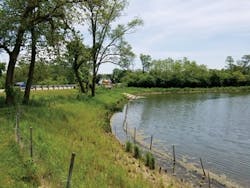About the author: Ryan Alltop, CPESC, is construction division manager for ENCAP Inc. Alltop can be reached at [email protected] or 815.748.4500.
Elliot Lake is a park in Wheaton, Ill., owned by the Wheaton Park District and the adjacent business owner. The basin was built in the 1970s to control storm water runoff from the adjacent developments.
Over time, one of the banks of the basin, which is shared with Winfield Creek, had been eroded and damaged by burrowing animal activity, causing the basin slope to fail. This resulted in the basin acting more as a compensatory storage area than as a storm water basin. The extended high-water periods caused erosion of the turf-grassed basin slopes, creating a dangerous condition for the fishers who frequent the basin.
Formulating a Plan
The Wheaton Park District realized the deteriorating state of the basin and wanted to improve its condition. The park district contracted with Engineering Resources Associates (ERA) of Warrenville, Ill., to complete the design and permitting of the basin.
With input from local fishers, local businesses, the Wheaton Park District and other stakeholders, ERA came up with a plan to repair the damaged slopes and retrofit the basin from its existing turf grass planting to a native storm water basin. This would prevent future damage to the slopes while still allowing access on the outcropping stone fishing piers located around the basin.
The plan also included river rock stone toe protection and coir log toe stabilization to help prevent any erosion at the normal water level.
The project then was put out to public bid and awarded to ENCAP Inc. of DeKalb, Ill. ENCAP dewatered the basin prior to excavation to allow the work to be performed with minimal sedimentation. The team used a dewatering system that included anionic polymers, vegetated pads and dewatering bags.
Putting the Pieces Together
Silt fence was installed just below the lowest elevation of construction within the basin to help prevent sediment from entering the water. A silt curtain installed in the creek prevented any detriment to the endangered Blanding’s turtle habitat that was known to exist in Winfield Creek.
Some trees needed to be removed from the slopes of the basin. These trees either had fallen down or were in locations that were going to be regraded to make the slopes less steep and more accessible to those using the basin as a recreational area. Clean Cut Tree Service of Grayslake, Ill., completed the tree removal.
Shultz Enterprises of Elburn, Ill., performed the earthwork and assisted with the outcropping stone fishing areas. It also assisted in installing a flap gate and new outfall to the basin outfall, which was designed to prevent backflow into the basin from the creek during periods of high water.
The river rock and coir log toe protection then were installed along much of the normal water line around the interior slope of the basin to prevent any future erosion of the toe of slope. The basin slopes then were planted with native vegetation and covered with BioNet erosion control blankets to prevent animals from being trapped. Native plant plugs and herbivory protection were installed in the spring of 2015.
The project then began its establishment and maintenance phase, which was a challenge due to the abundance of non-native invasive species seeds that continually are deposited in the planting area from adjacent offsite populations of those species. Through continued herbicide application and cutting and removal, ENCAP Inc. has established much of the slope.
Public Input
An unexpected challenge that arose during the project stemmed from the popularity of the spot among local fishers. The fishers who had lobbied for the area to be repaired were accidentally trampling the native vegetation on the way to their favorite fishing spots. The Wheaton Park District installed signs to direct the fishers to fish only from the outcropping stone fishing areas until the vegetation was established.
The park district also had to field many questions about the project during its construction due to its prominent location just south of Cosley Zoo and near a major roadway through the city.
The project has been welcomed by the fishers, area residents and tenants at the adjacent business complex, and the basin continues to be used as a recreational area. On any given weekday, local business employees can be seen eating their lunches on the slopes above the basin, and on weekends and in the evenings fishers can be spotted casting off from the outcropping stone fishing piers.
Download: Here
